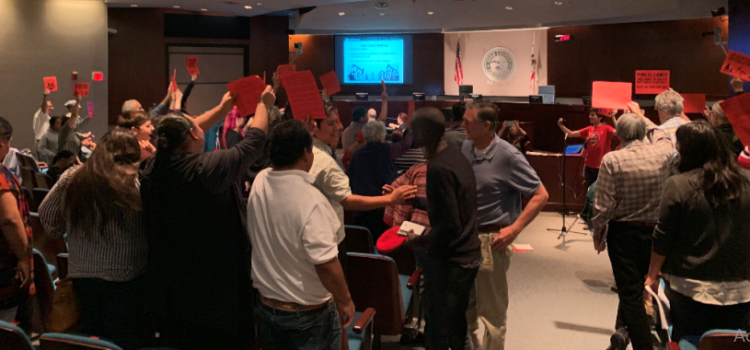
A public hearing on a proposal to open up more than a million acres of federal land in the Central Valley and the Central Coast to hydraulic fracking drew a large crowd at the Kern County Administrative Office Tuesday night.
Community members gathered before the meeting to protest the proposal. Advocates argued more fracking could present environmental and health issues to those in Kern.
“We are tired of our communities being full of contamination in the air and in the land,” said Saul Ruiz, president of Committee Lost Hills In Action. “The federal government, the state government and the county need to pay attention to the damage they’re doing to our families.”
This week’s hearings are cover an Environmental Impact Statement released in April that would open more than 1 million acres of public land and federal mineral estate to oil drilling and hydraulic fracking in Fresno, Kern, Kings, Madera, San Luis Obispo, Santa Barbara, Tulare and Ventura counties. The plan calls for the use of 40 new wells over the next 10 years, The Sacramento Bee reports.
“Expanding production to our public lands threatens our progress toward clean air,” said Genevieve Gale, Executive Director with the Central Valley Air Quality Coalition.
The proposal put forward by the Trump administration claims it balances “resource conservation and ecosystem health with the production of commodities and public use of the land.”
And the environmental impact statement claims, “The use of hydraulic fracturing in California has continued at the same low rate for many years, and it is unlikely to increase any time soon.”
Gustavo Aguirre Jr., a coordinator for the Central California Environmental Justice Network, challenged the assumptions in report. He says it understate just how much drilling could take place, especially if oil prices spike.
The report shows there is little impact to the environment because it underestimates how much drilling and fracking could happen in the state, Aguirre said.
The wastewater that is a byproduct of the fracking process could pollute the freshwater in sensitive ecosystems, according to Aguirre.
Gale said at the hearing, “The lowball unrealistic expectation and makes the entire EIR unacceptable.”
Gale said the Central Valley is already overburdened with pollution. She pointed out one in 37 deaths in Kern County can be attributed to chronic respiratory disease, which is 12 times higher than the rest of California. Gale believes these deaths are linked to the oil and gas industry. She worries fracking would introduce new pollutants like benzene and formaldehyde into the environment.
Representatives from both large and small oil and gas companies attended the meeting to support the proposal.
Tom Creswell, a chemical engineer in Bakersfield, said air emissions from the oil and gas industry were overblown, according to Valley Public Radio.
“Yes, the air is bad here,” he told the radio outlet. “We can’t make a mess in our own neighborhood. We have to drink water and breathe air, right? So it’s just in simple self-interest that you’ve got to take care of things.”
At the protest, Bryan Osorio, Delano City Council Member, spoke out not only against drilling on public lands but drilling altogether.
“We should stop oil and gas drilling on public lands,” he said, then hesitated a moment. “We should stop, period.”
Sandy Reding, a California Nurses Association member and nurse, discussed volunteering when Hurricane Katrina struck. She credits climate change to causing the natural disasters.
Reding also said climate change is the cause of Kern’s asthma problem.
“We cannot breathe as it is with the highest asthma rates in the nation, the highest pollution rates in the nation, and we’re not going to tolerate it,” she told the crowd. “We need to have Green Energy. Let’s work together. Let’s take that oil money and make new jobs, Green jobs, cleaner jobs so that our energies can live and breathe and drink clean water.”
Though a significant portion of the attendees spoke only Spanish, the Bureau of Land Management did not provide a Spanish interpreter — only a sign language interpreter.
Aguirre Jr. said it, “speaks to the environmental racism of the process.”
Public comments were not recorded for the public record. The address the issue, the Central California Environmental Justice, Central Valley Air Quality Coalition, Center for Biological Diversity and Sierra Club hired a court reporter for the hearing process so comments could be entered into the public record.
“This cost should not fall on the community, and so I urge BLM moving forward to take these oral comments seriously, to record them and to consider them when it moves forward and make a final decision on this plan,” Jason Pfeifle, climate campaigner with the Center for Biological Diversity, said at the hearing.
South Kern Sol reached out to BLM to ask why a Spanish interpreter was not available.
Gabe Garcia, manager of the BLM’s Bakersfield field office, told Valley Public Radio language interpretation at public meetings can turn into a slippery slope.
He also said the agency has been criticized for mis-characterizing verbal comments, saying “We want to make sure that we’re capturing their comments in their entirety and really capturing what they mean. So put your comments in writing for us so that we have them for the record.”
South Kern Sol is a youth-led journalism organization in Kern County. In their stories, youth reporters shine light on health and racial disparities in under-served communities across Kern. For more stories by South Kern Sol, head to southkernsol.org.